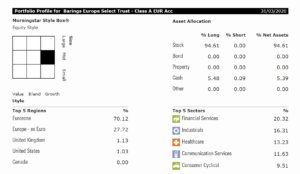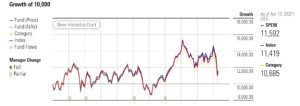Best UK Investment Funds for 2021
While buying and selling individual stocks may seem exciting, investment funds are where the majority of savvy traders put their money. Investment funds allow you to create a diversified portfolio in a single trade and to hedge your bets across market sectors. Even better, the huge number of funds currently available to investors means that you can easily find one that fits your investing goals and style.
So, how do you get started with buying and selling UK investment funds? In this guide, we’ll cover everything you need to know about what investment funds are, how they work, and what advantages they provide. We’ll also highlight three of the top online brokerages that you can use to start investing in funds today.
-
-
What are Investment Funds?
An investment fund is a collective pool of money, paid in by investors, that is managed and invested by a fund manager. Since any one investor’s money is mixed in with many others, a fund can purchase shares of a wide variety of stocks and other assets on behalf of all the investors in the fund. As an individual investor, you are now invested in fractional shares of many different companies and you can reap the returns provided by each of those fractional shares.
Importantly, when buying into an investment fund, you give up a fair amount of control to the fund manager. Fund managers decide what assets to invest in with the collective pool of money that they manage. That said, for the vast majority of investment funds, you can see what assets the fund is currently invested in and in what proportions. While this portfolio may change over time, it rarely changes all that quickly since funds need to move a huge amount of money every time they want to buy or sell an asset.
In addition, most funds have a very specific and limited scope that gives you an idea of what the fund will invest in. Some investment funds are targeted around a specific industry sector, such as energy, tech, or real estate. Others simply track one of the major stock indices, thus promising a return that is reflective of how the overall stock market is doing.
Best Brokerages for Fund Investing
ETFs are traded on the stock market, so you’ll need a reliable and low-cost brokerage in order to invest in them. Here are our three favourite online brokerages for buying and selling UK investment funds.
Plus500 - No deposit or withdrawal fees
Plus500 has positioned itself as the preferred brokerage for experienced CDF traders looking for a balance between cost and resourcefulness. The platform doesn’t charge trade commissions on trades, and its spreads for different trades/investments, though variable, are highly competitive. Plus500 currently supports over 2000 tradable financial instruments.
It’s important to note that with Plus500, you can only trade contracts for differences (CFDs). This doesn’t have much of an impact on your portfolio diversification since CFDs still change in value in response to the price of the investment fund. The only difference is that you won’t be eligible to receive dividends for ETFs or stock and share CFDs held. The upside, on the other hand, is that CFDs are also insulated from purchases and sales made inside any fund, so trading CFDs can be beneficial for tax reasons if you’re investing in active funds.
Our Rating

- Low Costs: No commissions and very competitive spreads
- Wide Asset Choice: 2000+ CFDs available for trading
- Tax Advantages: When trading CFDs, you’re not liable for assets sold by a fund
- No Dividends: When trading CFDs, you are not eligible to collect dividends
- Plus500 charges account inactivity fee
80.5% of retail CFD accounts lose money.Investous - Best for Trading Fund CFDs
Investous, like Plus500, offers CFDs for investment funds rather than fund shares themselves. Spreads at Investous are quite a bit higher than what you’ll find at Plus500 for many of the same ETFs, but there’s another big advantage that risk-tolerant investors can get when using this brokerage: leverage. Investous offers leverage of up to 500:1 for all accounts, which enables investors to take very large stakes in ETFs that are poised for a move as a specific sector or the market as a whole makes a jump up.
Unfortunately, Investous is somewhat limited in its choice of investment funds. The platform offers less than 50 ETFs and indices for trading. Still, it manages to cover a wide range of fund classes. Advanced investors will also be happy to know that Investous provides much more serious research tools than many other commission-free brokerages. For example, this broker gives users access to a custom charting software with a handful of built-in technical studies.
Our Rating

- Leverage: Up to 500:1 for all investing accounts
- Charting Tools: Custom charting platform with technical studies
- Educational Resources: Articles and guides for beginner investors
- Relatively Few Funds: Only 50 ETFs and indices available for trading
- High Spreads: Expensive compared to other CFD brokerages
Types of Investment Funds
There are several different types of investment funds, but most investors will need to know about two main types: exchange-traded funds and mutual funds.
Exchange-traded funds (ETFs) are traded on the open market as shares, just like individual companies. The share price of an ETF reflects the value of the assets the fund holds, so you see a return when the share prices of the majority of stocks or other assets in the fund increase. ETFs are easy to access through traditional brokerages, which is an advantage in and of itself for many traders. In addition, the management fees charged by the funds themselves are typically very low for ETFs.
Mutual funds are investment funds that are controlled by an individual firm or brokerage. Whereas ETFs are traded publicly on major exchanges, mutual funds are traded privately. In most cases, you must use the brokerage that offers a specific mutual fund to buy into it. However, some funds are tightly managed and are only available to small, select groups of investors. As for ETFs, the share price of a mutual fund reflects the value of the assets it contains. Keep in mind that mutual funds often charge higher management fees than ETFs.
Investment Funds vs. Trusts
Investors have an alternative to either ETFs or mutual funds for long-term investments: investment trusts.
The main difference between investment funds and trusts is that investment funds are open-ended, while investment trusts are closed-ended. Open-ended means that when investors put money into a fund by buying shares, the total amount of money available for the fund to invest grows accordingly. Closed-ended means that when investors buy shares of an investment trust, the amount of money available for investment doesn’t change.
This may seem like a small difference, but it has important ramifications for how funds operate. Since funds need to be prepared for a loss of capital when investors pull out, they tend to focus on liquid assets like stocks and bonds. Investment trusts are more stable, and as a result many invest in long-term assets like infrastructure, real estate development, or emerging economies.
However, this focus on the long term also changes how share prices move. Fund prices are more responsive to supply and demand, and managers have the option to invest more money to double down on success when investors are piling into a fund. Trust managers, on the other hand, don’t have as much flexibility to respond quickly to market conditions by buying or selling assets.
Advantages of Investment Funds
There are a few key advantages to investment funds that make them an attractive offering for many investors:
Hands-free Investing: For many investors, the number one reason to put your money in funds is that it’s simple. When you buy a fund, you can often leave your money where it is for years or decades at a time. The fund manager will rebalance the fund’s assets as needed to make sure that you’re receiving a return on your money, without any research or action on your part.
Portfolio Diversification: Another major advantage to investment funds is that they enable you to purchase a diversified portfolio in a single trade. You can purchase funds that cover the entire market to spread out your risk across industries and asset classes. Or, if you buy funds in a specific market sector, like tech, you can buy another fund focused on, say, real estate, to balance out your risk. In any case, investing in multiple assets simultaneously through a fund reduces your overall risk to any one company having a bad year.
Access to Assets: Some funds, and particularly mutual funds, offer access to assets that aren’t otherwise available to the public. As an example, a mutual fund offered by a major investment firm may invest in that same firm’s debt, which retail traders could never otherwise speculate on. Funds that invest in real estate often provide access to development projects or properties that aren’t traded in public markets.
Low-cost Investing: One more reason that so many investors like investment funds is that they’re cheap. ETFs typically have management fees of 0.25% or less per year, while mutual funds typically charge fees of 2% or less. When you consider how much you might pay in trade commissions, brokerage fees, and research tool subscriptions to invest in individual stocks on your own, those management fees are extremely inexpensive by comparison.
Choosing an Investment Fund
There are thousands of UK investment funds available to traders, which can make finding the right one for your investing style and goals something of a challenge. But, to help you get started, let’s take a closer look at what you should be considering when choosing an investment fund.
Fund Style
The first thing to think about is what type of fund you want to invest in. Is your goal to track the performance of the overall stock market or a particular industry sector? In that case, you’ll want to look for an index fund. These investment funds typically try to recreate market indices like the S&P 500 and track the index performance as closely as possible.

Alternatively, maybe you want a fund that tries to beat the market. Active funds typically have higher management costs since the fund manager is doing more research and placing more fee-incurring trades. But, many active funds boast a history of outperforming the major market indices year after year.
Finally, what if your goal is to generate steady income? There are many funds focused on dividend investing, which serve to maximise your dividend yield while also generating return on the share price you paid for the fund.
Performance
Performance is the first thing you should look at once you decide what style of funds suits your investing goals. There are often numerous ETFs and mutual funds from competing investment firms that attempt to achieve similar goals, but they may differ widely in how much money they’ve returned to investors over the years. While that could always change in the future, it’s a smart idea to opt for the best-performing investment fund in any fund class.

Along the same lines, you can look at performance to decide between different types of funds. For example, domestic stock funds may outperform emerging market funds for several years at a time. In that case, if you’re simply looking for any broad stock fund, it might make more sense to go with a higher-performing domestic fund.
Cost
Cost is another major factor to consider when choosing an investment fund. Funds typically have an expense ratio (for ETFs) or load (for mutual funds), which is the percentage of your total investment that will go towards management fees each year. Ideally, you want to find the fund that meets your goals while also offering the lowest management fees.
Keep in mind that active funds will typically have higher fees than passive funds. Not only is the fund manager doing more work in researching individual stocks to buy, but all the trades the fund conducts cost money. On top of that, active funds may have tax implications for you at the end of the year, since you’re on the hook for all the transactions the fund made even if you didn’t buy or sell any assets yourself.
Conclusion
Investment funds are a good way to grow your money over time, produce reliable income, and diversify your portfolio to reduce risk. The number of UK investment funds available to traders is large and growing larger, which is a good thing for choice. You can select an investment fund that closely matches your investing style and goals while offering low costs and excellent performance.
Ready to start investing in the best UK investment funds? Use one of our three recommended online brokerages to buy your first fund today.
FAQs
Are there tools I can use to compare UK investment funds?
Yes, there are a number of online tools you can use to easily find the ETF or mutual fund that’s right for you. Morningstar, The Financial Times, and Yahoo! each offer popular screeners for ETFs and mutual funds that rank investment funds by quality, cost, and past performance.
What is considered a low-cost ETF?
The cost of an ETF is measured by the expense ratio, which is the percentage of your investment that will go towards management each year. Some of the lowest cost ETFs on the market right now have expense ratios of around 0.03%, which is extremely inexpensive. In general, an expense ratio of less than 0.25% is considered low-cost.
Are there limits on how many people can invest in a fund?
Many investment funds do have limits on how many people can invest at one time. For ETFs, this is regulated by the number of shares the ETF issues. Demand for diminishing ETF shares can actually drive up the fund’s price, although this rarely happens in practice. For mutual funds, a fund manager may decide to close a fund to new investors once the investment pool reaches a certain size.
How much money do I need to start investing in investment funds?
How much money you need to start investing in funds depends on what type of fund you’re investing in. For ETFs, the minimum investment is just the share price, which can range from less than £50 to more than £200. For mutual funds, you’ll find that many funds have a minimum initial investment that may be upwards of £1,000. After you meet this minimum initial investment, though, you are typically free to contribute any amount of money to the fund.
See Our Full Range Of Investment Resources – Investments A-Z
Michael Graw
View all posts by Michael GrawMichael is a writer covering finance, new markets, and business services in the US and UK. His work has been published in leading online outlets and magazines.
Latest News
Halifax Share Dealing Review
If you’re looking for a low-cost share dealing platform that makes it super easy to buy and sell stocks, ETFs, and funds, it might be worth considering Halifax. You don’t need to have a current account with the provider, and getting started takes just minutes. In this article, we review the ins and outs of...
UK Banks Approved Nearly 1 Million Mortgages in 2019, 7.4% More than a Year Ago
The United Kingdom’s high street banks approved close to a million mortgages in 2019. Data gathered by LearnBonds.com indicates that 982,286 mortgages were approved in 2019, an increase of 7.4% from 2018’s 909,597. The mortgage approval entails loans for home purchase, remortgaging and other loans. Compared to 2018, the number of mortgages approved for home...
WARNING: The content on this site should not be considered investment advice and we are not authorised to provide investment advice. Nothing on this website is an endorsement or recommendation of a particular trading strategy or investment decision. The information on this website is general in nature, so you must consider the information in light of your objectives, financial situation and needs. Investing is speculative. When investing your capital is at risk. This site is not intended for use in jurisdictions in which the trading or investments described are prohibited and should only be used by such persons and in such ways as are legally permitted. Your investment may not qualify for investor protection in your country or state of residence, so please conduct your own due diligence or obtain advice where necessary. Crypto promotions on this site do not comply with the UK Financial Promotions Regime and is not intended for UK consumers. This website is free for you to use but we may receive a commission from the companies we feature on this site.
Copyright © 2022 | Learnbonds.com
We use cookies to ensure that we give you the best experience on our website. If you continue to use this site we will assume that you are happy with it.Scroll Up





